
Vol. I. No. 39 BASE CENSORED FOR OVER-SEAS MAILING AUGUST 26th, 1944

Parts Made Shop Modern And Efficient Rush! Immediate Action! Those were the words that greeted 1st Lt. A. L. Lamoureaux of the Machine Shop, a few weeks ago. It was an order from the front echelon 20th Bomb Gp., for a part to a B-29 airplane engine. It was broken beyond repair and the plane was scheduled to take part in a very important mission that same day. No replaceable part was in Air Corps Supply because the plane had preceded its spare parts from the states. The Machine Shop must make a NEW PART ... in a few hours! Tech orders and blue-prints of this engine were available. Lt. Lamoureaux studied them with his assistants M/Sgt. Bolster and Cpl. Loch, and machinist and engine specialists stood ready. As we enter the machine shop we are impressed with its modernity. Hard concrete floors with various machines of all types, lathes, shapers, grinders and milling machines spotted several yards apart and covering some 12,000 square feet of floor space. At each machine there are one or two men who are either army machinists or engine mechanics. Occasionally we see an Indian machinist who works under the tutelage of the army specialists. All of these men are qualified to turn out any tool or fixture of any engine. Also any tool or fixture that is repairable can be made perfect again in the shop. For example, many times parts have become corroded or injured due to a long and delayed journey from the states. They might have been in Africa or Sicily first, and had been through bad weather and rough handling, but the Machine Shop repairs and makes them as efficient as the engineers in the states planned them to be. As a result a great number of engines and their parts are saved from the scrap pile. The Machine Shop has been in existence since the opening of this Depot almost a year ago. It was setup and organized by machine specialist T/Sgt. Rios who is now in the States after spending 27 months in this theater. Since then the shop has expanded and has moved to a new location. It has been a source of great satisfaction that even during the moving this shop operated at full speed. The night shift worked that day turn at the new location setting up machines while the day shift carried on at the original shop. As each machines was installed the operator would take over, until finally, the entire group, machines and men, had moved without the slightest let-down in production or working hours. The Machine Shop has made a brilliant record in production and repair ... and on many occasions with very little time to do the job in. NEWS ITEM JULY 25th: B-29 Bombers of the 20th Bomber Group were over Japan today causing widespread devastation. ... All in a days work at the Machine Shop. |
Tiger Rag
Needs Your Help
ON DECEMBER 4, 1943 the Tiger Rag made its first appearance on this Depot. It was then published under the name of 28th Tiger and appeared as a four page paper. Beginning with the third issue it was censored for overseas mailing so that any one, who wanted to, could mail a copy to the folks back home. At the present an unusual number of men are mailing copies back to the states, approximately 30 percent. The tenth issue saw the paper expand to eight pages and the twenty-first appeared in the present size.
THE PAPER went along well until the first of July. There were difficulties of course. Every publication has its good days and bad. Production of the paper has always been quite a problem especially since it is put out in an Indian shop. The staff doesn't always understand the men who do the setting, composition and printing and it is difficult for these men to understand the men who are trying to publish a paper for you. According to a statement of Major Stuart R. Petersen some time ago, "The fact that the paper comes out at all is an accomplishment; that it comes out on time is a miracle."
THE LATTER part of June an order originating in Theater Headquarters prohibited the use of Special Service funds for the publishing of base papers. Since that time the paper has been seeking funds to pay bills which have accrued. The cost of printing, folding and making cuts amounts to about 1500 Rupees per month and frankly there seems to be no way to raise it excepting through a voluntary contribution. To equalize the expenses it would be necessary to receive from each man on the Depot a sum of eight annas per month. If you want a base paper this contribution will be necessary.
LAST week at a meeting of the Officer's Club, Colonel Frank D. Hackett outlined the situation to the officers present. Colonel A. K. Tigrett, President of the Officer's Club, presented a plan to pull the Tiger Rag out of the red. A motion was made and unanimously carried to contribute 3,000 Rupees to the A and R fund of Special Services for the payment of July and August bills. Officers have volunteered to contribute various amounts each month. These contributions may be made through their own organizations.
The Tiger Rag has always been your paper. It is by and for the enlisted men. It really should be for the Depot and it should be the pride of every man on this base. This gift from the officers is a very gracious offer. The paper has been saved for two months thanks to their fine gift. It will now be a part of everyone's responsibility to keep it going. Other posts in India are using donations from the men on the base to pay for their papers. Is it worth less than two annas per week to have a base paper? Surely that is a question which you will not hesitate long to answer in the affirmative.
The staff of the Tiger has worked hard to make it as good a paper as possible. Since most men read daily newspapers and since the Tiger is a weekly, news of world events are merely a repetition of what is found in the daily paper. News items found in Command Post and CBI Roundup are another repetition but there is much that happens on this Depot that is news and the aim of the present staff has always been to make the Tiger Rag a Depot newspaper. To do this your help is important, first to make the printing of the paper possible and also to contribute items of interest to all on the base. Each day many things happen here which others would like to know about. Bring them in. Phone extension 2 and a reporter will take your news items over the phone or if the story has a picture the photographer will come to take it. It is your paper. Help to make it not only possible but to make it the best paper in the CBI Theater, the best in the Army.
Captain William Raney, Special Services Officer, will pay all bills and an accounting for these funds will be printed regularly in the Tiger.
|
A LETTER FROM COLONEL HACKETT
22 August, 1944
SUBJECT: Tiger Rag
TO: Pfc. William A. Frank, Editor, Tiger Rag
1. Newspapers are expected to function without comment by most of us until such time as we differ with the policy of the editor or are dissatisfied in any way.
Then, it seems, it is the great American privilege to wave arms and censure loud and long.
2. I want to take this opportunity to say that I believe the Tiger Rag is a fine paper and that it is doing an excellent job in reporting news of this Depot as well as contributing to the general morale of the men here.
3. I want you to know that the efforts of your staff, column reporters and contributors are appreciated by this Command.
4. Any military installation is no better than the quality of its personnel.
The Tiger Rag is a history of the Depot written by the men on the Depot.
I sincerely trust that their pride in the Depot and in this, your recording of their lives here, will meet with their every support in helping you to keep this fine paper, and to make it the best in the field.
Albert J. Redway, Lt. Col., A. C.
For FRANK D. HACKETT, Colonel, Air Corps., Commanding.
Depot Men On Radio
As a regular weekly 9:00 o'clock Tuesday night feature the "Jubilee Quartet" of the 1953rd Ordnance Co. will broadcast from Station VU2ZU. The quartet is composed of T/5 Nacolin Graham, T/5 James Wallace, Pfc. Curtis Martin, Pvt. Ulysses Sanders and is coached by Pvt. Ed Small.
Bob McCarthy of the 47th, former Chicago Radio artist and Charles Mason of the 1953rd will be heard on VU2ZU's weekly dramatic presentations, 9:00 p.m. Wednesdays.
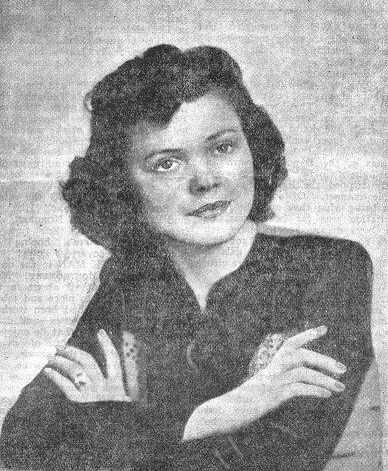 She is an angel, isn't she?
And in more ways than one, because the beautiful young lady above is Miss Margaret Angel of West New York, N.J.
Miss Angel is this week's winner of the Sweetheart Contest and with the previous weeks winners, will be voted on by the Depot to determine
the "Sweetheart of the Depot."
We wish we could tell you a little more about her, but Pfc. Louis Martin, whose entry she is, happens to be away at rest camp.
Hey Louis, c'mon back, your gal's picture is in the paper.
She is an angel, isn't she?
And in more ways than one, because the beautiful young lady above is Miss Margaret Angel of West New York, N.J.
Miss Angel is this week's winner of the Sweetheart Contest and with the previous weeks winners, will be voted on by the Depot to determine
the "Sweetheart of the Depot."
We wish we could tell you a little more about her, but Pfc. Louis Martin, whose entry she is, happens to be away at rest camp.
Hey Louis, c'mon back, your gal's picture is in the paper.
|
Cabaret Coming
Floor Show 'n Everything
There will be a Cabaret party at Rajah's Rest on Monday, August 28, 1944, at 7:30 P.M. It will be just like downtown with floor show, eats and drinks by the PX. Home was never like this.
Honest! There is going to be a floor show. The chorus girls will be new and different. New? Well anyway, they will be some rebuilt models made from a few GIs which were found on the Depot and were in fair enough state of repair to be torn down, washed and rebuilt so that they will resemble the real thing, if you forget your spectacles or tie a handkerchief over your eyes. The cigarette girls will be none other than the gals of the R.C.
The party will be held in the patio unless it rains. In case of rain the celebration will move inside to the canteen. Have you seen a pretzel since you are in India? They say there will be some at the cabaret which together with checkered table cloths and a special menu by the canteen should make the evening quite lively.
Remember the PX will serve beer and the floor show will begin promptly at nine o'clock.
Dr. Griffiths' Talk Very Interesting
The talk on the Peoples of India, the accompanying songs and the demonstration on how to wrap a Saree was thoroughly enjoyed by the sixty or more soldiers who were on hand to hear Doctor W. G. Griffiths and his wife last Tuesday evening. Mrs. Griffiths sang several American folk songs. Doctor Griffiths was presented by Elizabeth Cubley, the new program director for Rajah's Rest. He traced the origin of the races which comprise modern India showing how racial movements in all sections affected the appearance and culture. Mr. Griffiths pointed out that there are no pure races in India.
Mrs. Griffiths sang a song in Hindustani telling of the glories of the Birthplace of Krishna and then gave a translation in English. Mr. Andrews her accompanist gave a good rendition of Indian music.
Dr. Griffiths then sprang a surprise on the fellows present. He had with him one of his missionary friends from China, Dr. Walter Caldwell, author of several books on birdlife and animals of China. He is a noted tiger hunter and gave a very entertaining version of the manner in which he tracked down "Old Horseface" a notorious man killer. Over a period of three months the Doctor killed seven or eight tigers before he finally tracked down and killed the male tiger which had killed two of his best friends. Doctor Caldwell had sworn vengeance on "Horseface" and would not rest until he had put him away. One evening while dedicating a church in a small Chinese village he was told that his quarry was around. Gathering his trackers and gun he took off after "Tiger God" as the natives called the animal. Locating the animal he killed it and skin and skull of this magnificent beast is now on display at Museum of Natural History in New York. Dr. Caldwell goes thru all the motions as he talks and his story of being caught unarmed by a snarling tiger and his subsequent actions in defending himself with a white umbrella "afloppin'" as he termed it was most amusing. He admits he laughs about it himself but we could well understand how, as he put it, "I was frozen stiff but still able to retreat, umbrella afloppin.'"
Ann Sheridan Raises CBI Temperature
The Depot anxiously awaits the arrival of Ann Sheridan, Hollywood "oomph" girl and screen star. At present the glamorous screen star is somewhere in CBI land spreading more fever than dengue, malaria and temperature combined. Miss Sheridan is a Texas girl who was selected a few years back by West Coast bigwigs, in their search for a girl with "oomph." At this time the only way to define the word "oomph" is, that which Ann Sheridan has. And Boys, she's got it HERE.
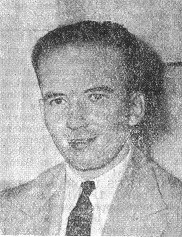
|
New Canteen Manager
John Richards, restauranteer and caterer, formerly of London, England and Pischewar, India, has been engaged as Maitre D' of the Rajah's Rest Canteen. Mr. Richards has worked in the restaurant business for a number of years. In fact it has been his life's work. After leaving school he started in the food line and has worked in several of London's leading establishments. He came to India from England over six years ago, and has owned and operated his own restaurant at Pischewar, India most of the time. His first reaction to his new position was amazement at the large number of people fed at the Canteen daily. In fact since he arrived here two weeks ago the quantity of food, beverages and other items served at the Canteen has almost doubled. He modestly refers to this influx as coincidence, but we suspect otherwise.
Innovation under Mr. Richards have been a new soda bar and new fountain equipment which has recently arrived from the States via Africa. Work done on the new bar was accomplished by Enlisted Men of the Board of Governors of Rajah's Rest, Sgt. Joe Perry, Pfc. Donald Brewbaker and Cpl. Wicksten, Tiger Rag staff artist, is going to paint a mural for the back of the bar. In addition, milk shakes are now being served, using a secret recipe given the Canteen by a former Walgreen expert who prefers to remain incognito.
The Canteen staff, in addition to the new manager, consists of 22 bearers, 9 cooks, 8 dishwashers and 13 sweepers, with more being hired daily. Mr. Richards states "I hope in time to give speedier service, more seating and a larger variety of food."
YOUR JOB IS IMPORTANT !
Some of us think of our jobs as of very little if any importance in winning the war. Most of us are so close to our own little individual task that we fail to see the whole picture. We see only the unimportance of the part we play and few of us sit back to see the whole picture. No individual ever won a war. That is what armies were made for. Let's just sit back and see what others think.
Back in May of this year, Air Force magazine published an article in which the hardships of the great task of building this Depot were set forth and then went on to tell of its importance to the war effort in the CBI Theater. There are quite a number of copies at Rajah's Rest and it will pay us well to read what is said about our importance in winning this war.
We, who are far removed from the actual sound and fury of battle, find it very difficult at times to feel our importance to the struggle. We somehow feel that we are not doing all we should to help. Those of us who are removed from the task of service or supply have still more reason to feel away from it all. Driving a truck to town for Depot supplies does not seem like fighting a war or shoving a needle into someone's arm does not give the "on the spot" feeling of shoving a bayonet into some Jap's belly. Perhaps it isn't fighting we're doing, perhaps a machine gun beating a tattoo through the jungle would lend an element of satisfaction but armies must be fed and supplied.
Let us not fail to give credit to the bravery and courage of those who are in actual combat. They are the guys with the guts to take it. They are winning this war by their own blood and sweat. Some of us others must have the guts to hand them their guns, their airplanes. Someone must sweat out their engine overhaul jobs. Monotonous? Yes! So monotonous that we ache like hell to go home. We're lonely for our family and friends. We can't see any point to our job here. The men in the front lines and up in the air are lonely too. They also want to go home.
At all times we must remember that Myitkyina would have been impossible were it not for the steady stream of supplies which someone had to keep moving up, which someone had to unpack and check. Recent B-29 raids on Japan required a great amount of sweat on the part of those who dealt with the functions of service and supply. Both invasions of the European continent without a doubt took the efforts of thousands of men whose job is not directly related to fighting, who sweat out the job of the never ending function of service or supply. Without these men and without the sweat they poured out, the men taking part in the actual invasion would never have been able to move a step toward France. Guam would have been impossible. Important? Vitally important! Whether you are a medic painting those ugly spots all over us, whether you break down rations, whether you run a movie machine to help build morale or whether you write a column to build the morale of your own company.
Combat troops are very essential in battle.
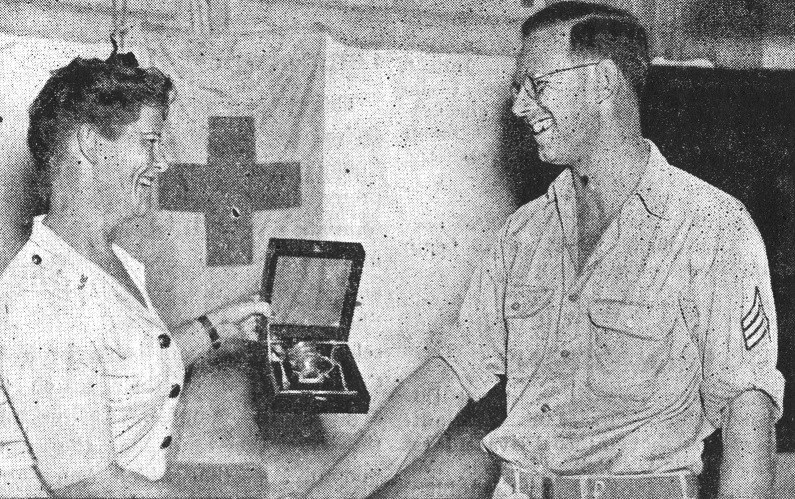 Proud Papa Sgt. Louis Cook is here shown receiving the prize for winning the contest from Doris Ewing at Rajah's Rest.
Proud Papa Sgt. Louis Cook is here shown receiving the prize for winning the contest from Doris Ewing at Rajah's Rest.
|
Perhaps we think we don't fit in. Perhaps we don't feel that we are doing enough or that the job is too small for our talents.
Regardless of the job and its importance, regardless of whether our deal is right and just, regardless of whether we think that someone else is less capable, we are here to do that job and no matter how small it may be, it is of major importance to success in battle. The old saw "For want of a nail the shoe was lost. For want of a show the horse was lost," packs a great wallop in the Army. Let us remember that and if we are only the nail, let's be a damn good nail. We have but one reason for being here, which no American soldier will deny, and that is to win a war, to destroy the enemy and get back wither we belong. Your job is of utmost importance!
TRAIN GUARDS HAMPER WAR
The train hurtled along the tracks that made a pathway through the dense foliage of the jungle. Zing! The sound of a Carbine firing penetrated through the click-clack of the trains undercarriage. Then the staccato notes of a Thompson Submachine gun split the air, and bullets splatted against telegraph poles and richoted through wires and connections. What was this? A battle? Merrills Marauders attacking Japs? No, just two GI's on train guard firing at fowl. Nearby though, were American and British combat jungle troops, who were disturbed from their much needed rest, and alerted by their CO, who was alarmed by the firing.
That night, the same CO tried to send an urgent message to the rear echelon. He couldn't get it through . . . the lines of communication were down. Results: (1) Tired nervous men whose relaxation periods had been disturbed; (2) A jungle outfit which was without the necessary supplies because poor communication resulted in the failure of their CO to get in touch with rear echelon supply units.
Climax . . . A Jap victory with heavy American losses.
Anti-Climax: . . . Two train guards who had done the unnecessary firing, were apprehended, broken, Courts Martialed and fined.
Moral: . . . Before going on train guard, read your "Instructions For Train Guard." Above all don't emulate the two men of the above narrative . . . use your gun ONLY for its prime purpose, to attack or defend against the enemy.
 Editor, Tiger Rag,
Editor, Tiger Rag,
Recently while walking through the streets of town, an enlisted man from this Depot was apprehended by the Military Police. He was booked on the spot, marched to a nearby camp, booked again, made to listen to a lecture on military discipline, given three quarters of an hour of close order drill and then released with the threat that he had better not be picked up again.
His crime, for as such it was treated, was that of wearing a bush jacket. This, in spite of the fact that, time and time again, bush jackets have been authorized for wear in town. Memorandum No. 22 Hq. BS 2, 23 Mar 44; GO 9, Hq. BS 2, 21 Mar 44; GO 14, Hq. BS 2, 15 May 44 and, in line with these orders from BS 2, Memorandum 150-7, 5317th AD Hq. (Prov.), 24 March 44, all authorize the bush jacket for wear in town. While a certain amount of confusion cannot be avoided in an Army the size of ours, it seems neither sensible nor logical to deliberately create this confusion. These bush jackets were not purchased by the enlisted men on their own initiative; they were given plenty of reason to believe that they were authorized to spend their own money in order to present a neater appearance. Despite the fact that we are in the best paid army in the world, when allotments are all deducted, the average American soldier makes about twenty five dollars a month. It is no joke to lay out half a month's salary on an article and then be told that the article is useless.
Perhaps, the objections lay with the shoulder straps rather than the jacket itself. If so, the enlisted man was again in the right. Army regulations forbid the wearing of these straps on the regulation service shirt but authorize them on the overcoat, summer and winter blouse and field jacket. The bush jacket is not worn as a shirt. It is worn in lieu of the summer dress blouse and, as such, the shoulder straps are authorized. What is my basis for this conclusion? Reason alone dictates that a belted garment, worn outside the trousers hardly conforms to the description of a regulation service shirt on which the straps are forbidden.
There is another side to this incident, more important than those already brought forth. Under the 104th Article of War, the commanding officer of any detachment, company or higher command may, for minor offenses, impose disciplinary punishments upon persons of his command without the intervention of a court martial. The ruling therefore gives the right to administer punishment to the commanding officer only and does not delegate it to any person higher in rank than the offender.
Punishment, as defined by this Article, includes admonition, reprimand, withholding of privileges, extra fatigue, restriction and hard labor without confinement. Therefore, we see that this soldier was not only admonished but threatened, in violation of Army Regulation 600-10, his free time was taken away from him and extra fatigue duty was given to him, all in violation of the rules that were established not only to punish a soldier but also to protect him.
The 104th Article of War also grants the soldier the right to demand a court martial before accepting punishment. In this instance, that right was apparently waived by the prosecution not by the person who had the right to do so.
In summarizing this incident, we find that the soldier was arrested for wearing an article frequently authorized, and wearing it in the proper manner. Since the orders authorizing the wearing of these jackets were not rescinded until 13 Aug 44 (The notice not reaching this Depot until 17 Aug 44) and, having encouraged the men to purchase these jackets, it would be wrong to ever rescind these orders, it seems that no offence was committed. Nevertheless, he was punished by a person having no authority to do so and apparently for the sake of convenience, his rights were totally disregarded.
This is a deplorable situation and should not be permitted to continue. It is frequently said that the enlisted man has no rights. This is not true. The enlisted man does have rights. We are not in the army of a dictatorship; we are in a democratic army, an army that has established rules and regulations to guard the rights that are granted to the enlisted man. It is up to those in charge to see that these rights are respected. Our army cannot be expected to fight for that which they themselves are denied.
Were this the only incident it could be said perhaps that it was a mistake, but it is not. This method of punishing minor violations seems to have been established as a general practice in town for various offenses. Failure to salute a superior officer, incorrect uniform or unsoldierly conduct are all recognized misdemeanors for which the method and kind of punishment are set by Army Regulations. These regulations were compounded to be adhered to, not to be disregarded. It is hardly the duty of any one man or group of men to decide that these regulations are impracticable and therefore initiate a system of their own.
We do not seek retribution for the men who have already been punished under this system but we do hope that the system itself will be corrected so that it will once more follow the dictates of the Army that it represents. Pvt. Ed. McManamon
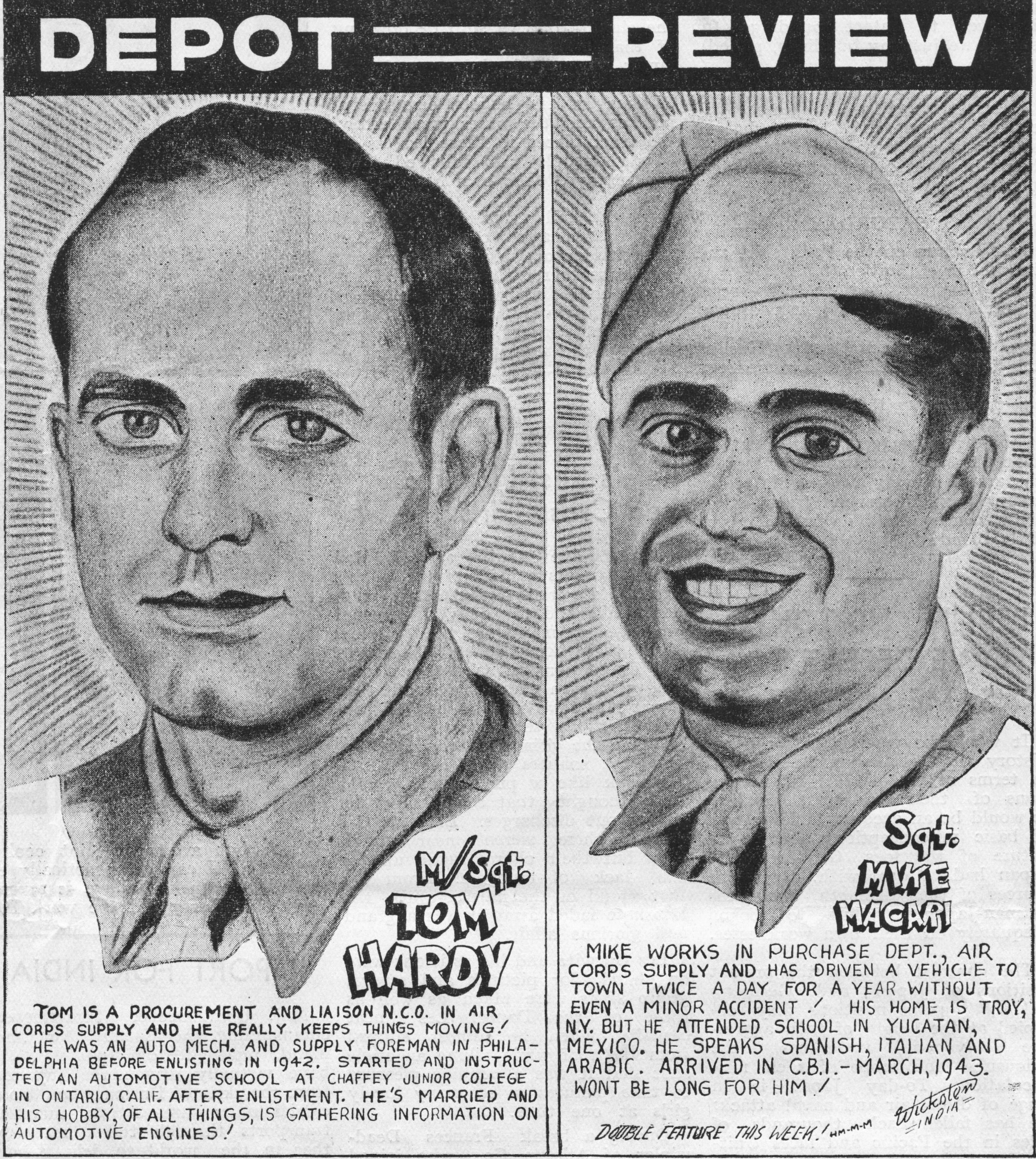
|
Special Services, in town, has made available to the men of this Depot seven newly arrived editions of books just off the press in the States. These books contain material on many fields of endeavor and will serve as a splendid guide to the men interested.
There are two on Diesel Engines; one is "American Diesels" and the other is the "Diesel Operators Handbook," which met with much enthusiastic response when it first appeared. Timely and up to date, with the many recent developments in this field, it is sure to be a welcome addition to the list of others. Published by Prentice-Hall and prepared by many men prominent in diesel engineering, it is authoritative and well presented.
Two photography books, the sixth edition of the well known "Graphic-Graflex Photography" by Morgan and Lester really needs no introduction to picture hounds. "Aerial Photographs," prepared by A. J. Eardley, explains the interpretation and treatment of such photographs.
For students of History we have "World History," by Slosson, Boak and Anderson. These names are familiar the world over as tops in history texts. It gives a concise, modern study of the world's history up to the beginning of the present conflict. It is on the order of Wells "Outline of History," but gives maps and plates to accompany the various chapters on peoples and their progress through the ages. It is sure to delight lovers of history.
These seven books will be available to all men of this Depot. We have the promise of Special Services that more of these reference books will be made available. Please be careful of them. They are here as a result of the earnest efforts of the girls at the Red Cross Club and Special Services. Bookworm.
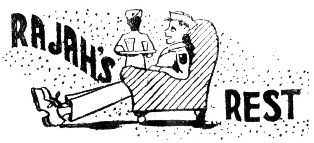
|
We have long hoped for Army Institute classes to be formed on this base, and at last it seems to be approaching a reality. There has been an ever increasing number of you who have come to the club for the necessary information and material for enrollment. It has become a sizable part of our job at the club to perform this service since the supplies of texts has been made available as of July 1 in the theater. The texts are nearby and the amount of them adequate now. But the limitations of a correspondence course cannot be denied. So we have gone a step further - slow but sure - and are will able to realize the possibility of forming a class. In essence the class will just be a group of you working together with individual texts, for which you have sent for individually, under the guidance of one of your numbers, an enlisted man, whose background and interest is allied with the field. The class will in no way be an educational institution granting credit but will be simply the means by which you may get the training for which any high school in the States will give you credit.
The first teacher, whom we and the Hq., U.S.A.F. Institute in town have chosen to perform this valuable service, is amply equipped to do the work. He is Charles S. Brant of the 52nd, who graduated in 1941 from Reed College, Portland, Oregon, in Sociology. Immediately upon graduating he taught there, assisting in the Social Science department. After that till 1943 he did post graduate work in Anthropology at Yale; as well as receiving his Master's Degree there, he worked as a research assistant in the Yale Institute of Human Relations. There is no question of his extreme ability. Charles has chosen from the list of available courses and is prepared to tech any one of the following subjects: Algebra, Plane Geometry, Trigonometry and English Grammar. We will choose which course he will teach when we can ascertain which subject will be most in demand. If you wish to take the course for later high school credit, if you wish to brush up on the subject and do not need the credit (i.e. if you have already a high school diploma or have been entered in a college), or if you wish to sit in on the courses because you would enjoy it, come into the office and make it known to Isabelle which of these courses you want. If you are not already enrolled in any self-teaching course, we'll get you enrolled if you want to join the class. There is no question that you will get a better, a quicker and more constructive training in a course if there were a class. So do stop in. Perhaps this is but the beginning of a variety of classes we can have. We are not competing or meaning to compete with any existing class on the base. We believe there is already a Math Class which has been formed for the same purpose. We see no point in such competition as that. We stand for all the educational facilities possible.
The next club notice we wish to speak of is the work that the Board of Governors is accomplishing. The function of such a governing board is of such an intangible nature that more often than not there is never credit given. But we as a staff, who work so closely with it, are grateful to announce it to be a very substantial benefit to us and to the club. Not only are we getting the club painted, their most menial contribution, but also various problems, such as our dances, etc., are being very capably handled, to our intense relief. We think that at the end of October when the new board will begin its function, the present board can retire
 26/27 AUGUST - "DIXIE" Dorothy Lamour, Bing Crosby
26/27 AUGUST - "DIXIE" Dorothy Lamour, Bing Crosby
29/30 AUGUST - "FATHER TAKES A WIFE" Adolphe Menjou, Gloria Swanson, Desi Arnaz 31 AUGUST and 1 SEPT. - "JITTERBUGS" Laurel and Hardy |
The bridge tournament is getting on famously. The quarter finals will have been played by the time this article appears. The first week no one bid or made a grand slam so that prize was pushed ahead to the second week. Sgt. Maurice F. Levin of the 2005th and Pvt. Joseph Epstein of the 47th took the honors this past week in the form of an accumulated prize of the week before with last week's. They bid and made a grand slam and were each given two dinners at a hotel in town. They took their opponents to dinner and it was reported to be a very enjoyable occasion - good food! The champions of the finals, it is planned, will challenge the officers of the base. We shall see what we shall see!
The Camera Club is beginning to form itself and function. It always will accept new members.
The new technical books (we managed to get them from Special Service in town) are ready to be used. Pfc. Pharo has described them in the library column. They are beautiful books and we intend getting more for you.
Salaam, Sahibs! Fearless.
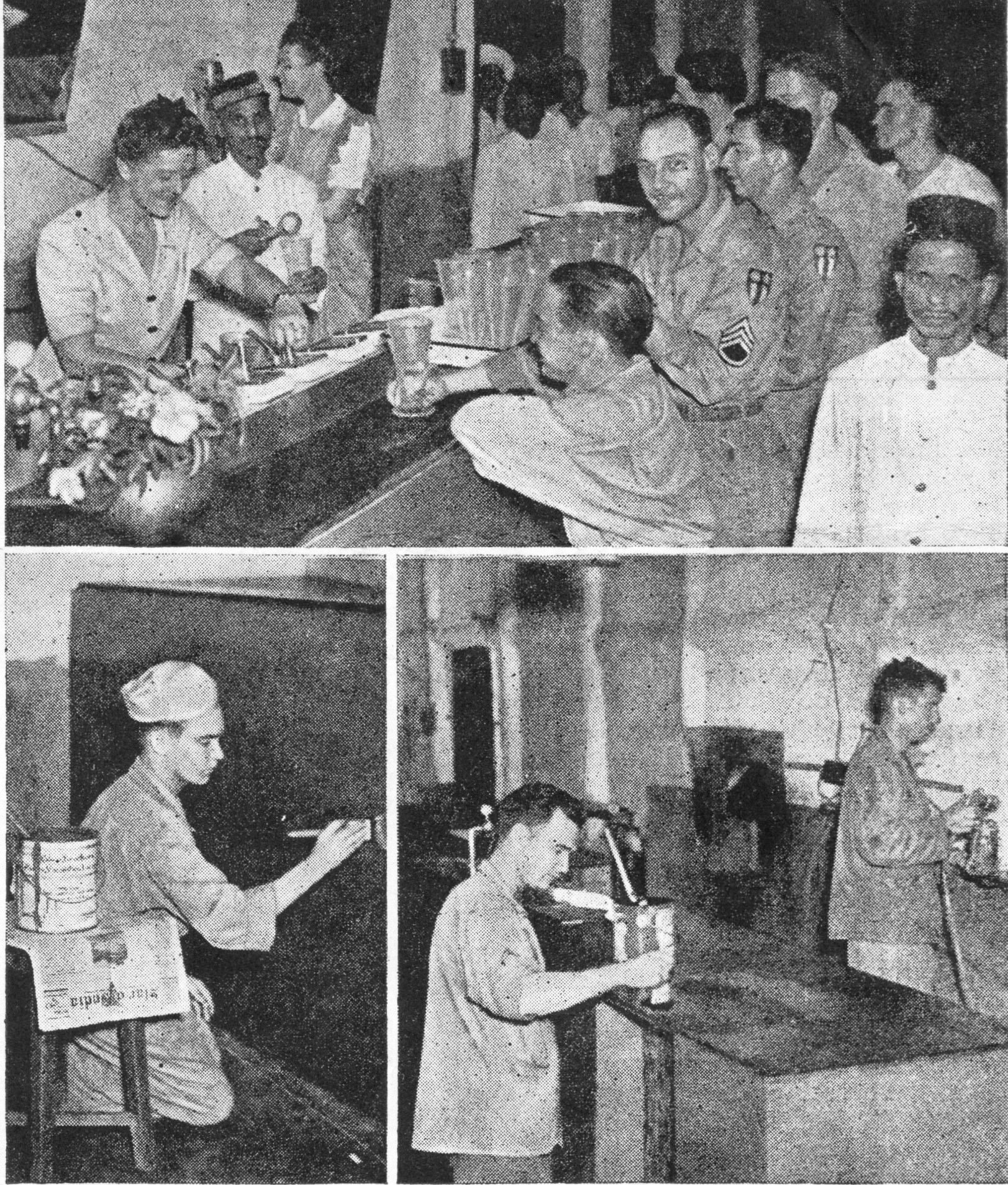 A hot afternoon - but cool at the Rajah's Rest soda fountain where a GI can get practically everything that "Pop Jenks" served.
The sequence above is reversed because Pvt. Don Brewbaker and Sgt. Joe Perry did the work BEFORE they got the sodas.
A hot afternoon - but cool at the Rajah's Rest soda fountain where a GI can get practically everything that "Pop Jenks" served.
The sequence above is reversed because Pvt. Don Brewbaker and Sgt. Joe Perry did the work BEFORE they got the sodas.
|
Rajah's Rest Host To
Red Cross Girls
Twenty-five newly arrived Red Cross workers came out to Rajah's Rest to see what a well set up club looks like and to deliver personal messages to many of the soldiers from their home states. The Bengal Tigers were on hand to welcome the gals with some more of that sweet music which soon had all present shuffling their feet.
When the girls made their appearance the soldier made the rush of '49 look like a piker. You would have thought that the Army was giving out discharges. Like all GI dances there weren't near enough girls but their charm made up for the lack of numbers. From the first sound of the music until the last note faded away it was a grand and glorious affair.
Les Gurwitz and his assistant were on hand for pictures and several group shots were taken as well as those of the dancers. Les, a near casualty when he almost slipped from the roof while taking an angle shot, said it was a genuine pleasure to take pictures of so many lovely girls at one time.
During a break, Frances Deadwipler of Atlanta, Ga., who joined the Red Cross after losing her dearest friend, a lieutenant (JG) in action off North Africa, sang several songs. "Someday I'll Find You," "Always In My Heart," and "My Buddy."
Most of the girls have already been assigned but several have promised to be on hand next Sunday morning and afternoon unless they are sent out before then.
|
WACS VISIT US
We had the pleasure of interviewing four of the WAC's last Sunday evening. The girls were unanimous in their approval of the Red Cross Club and are looking forward to being able to participate in the regular Wednesday night dance. S/Sgt. Perry, the Chairman of our Board of Directors at Rajah's Rest, was able to make this possible and we can expect to see most of them from time to time. Staff Sergeant Marie A. Higgins from Brooklyn accompanied by Corporal Grace Balice from New York City told us that they were not at all sorry that they had been assigned to this theater. Sergeant Higgins along with the others had toured the city last Saturday and commented on the fact that it was very interesting. Private Mildred McDonnell from Tennessee expressed surprise at seeing things looking really civilized. Like the non-comms they too were starry eyed at the prospect of dances the same as back home. We hastened to correct them as to the degree of back homeness they may find here but we think we speak for all of the E/M when we say to them, "Welcome WAC's. We'll fight this war side by side." |
|
QUARTER FINALS The Rajah's Rest Bridge Tournament reached the quarter final stage this week with the semi-finals and finals coming up next week. Bracketed in the quarter finals are Pfc. D. D. Shay - Pfc. Bob Hunter, Pvt. Bill Lyttle - Sgt. Sydney Pollner, Pfc. H. L. Meyer - Pvt. Larry Stern, M/Sgt. Joe Conroy - Pvt. Alex Lowovike. Note the number of privates as against senior non-comms in this intellectual game. |
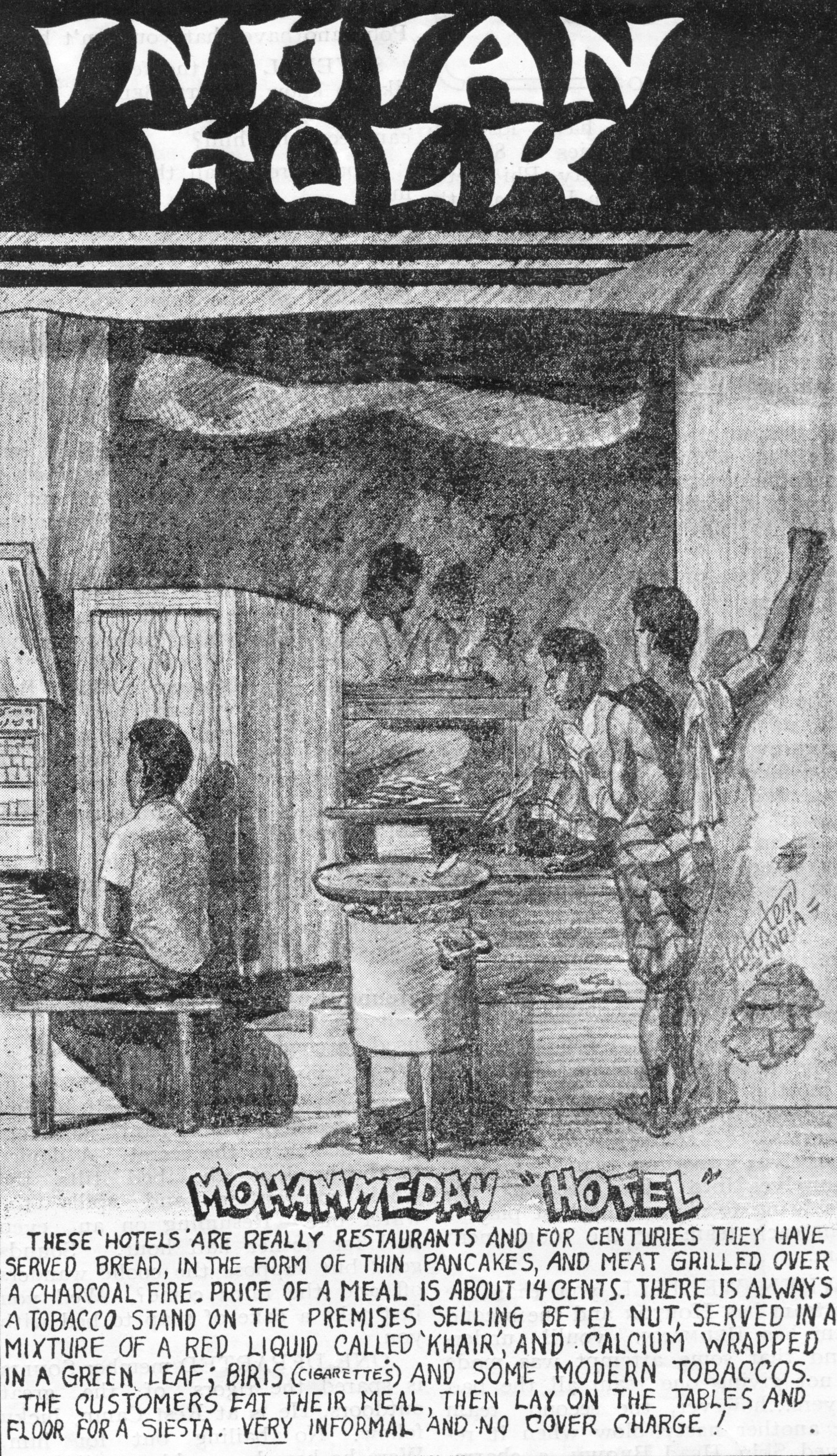
|
REPORT FOR INDIA
Maj. Gen. George Stratemeyer commanding the Eastern Air Command, reported from India: "We have virtually driven the Japanese from the skies of Burma. Our troop carrier units are flying unarmed transports through the worst weather in the world to deliver hundreds of tons of food, ammunition and other vital materials to Allied ground forces deep in Burma, many of them with no other means of supply. The Air Transport Command greeted the monsoon season by boosting the tonnage hauled over the Hump to new records both in June and July. Airdrome engineers are building up our fields against terrific handicaps. So well did they do their job with the liberated airstrip at Myitkyina, that during a 12-hour stretch recently the field averaged better than one take-off or landing every two minutes - this with Japanese troops only 2,000 yards away."
General Arnold, personally reporting on operations of the Super-Fortresses (B-29s), which are so new they are being directed straight from Washington, said their latest mission, against Mukden, in Manchuria, was the most destructive to date. Lieut. Gen. James H. Doolittle, Commander of the Eighth, said from London that his bombers, in their selective elimination of Nazi war industries, recently have attacked 15 major oil refineries and eight major synthetic oil plants.
Lieut. Gen. Carl A. Spaatz, commanding U.S. Strategic Air Forces in Europe, said the landing operations, covered by his aircraft, are now "approaching triumphant success" - to which Lieut. Gen. Lewis H. Brereton of the Tactical forces added that a factor in this was the pre-D-Day bombing of continental objectives with 44,000 tons of bombs.
From the Far East, Lieut. Gen. George C. Kenney said the forces in the South and South-west Pacific have stopped, then crushed the Japanese Air Force. "Last year we advanced almost 200 miles, so far this year we have gone forward 1,000 miles and we are not stopping. Our bombing line is still advancing; Japan is getting closer all the time." - USOWI.
The TIGER RAG uses news and editorial material furnished through Camp Newspaper Service and other sources. Republication of credited matter prohibited without permission of CNS, 205 E. 42nd St., N.Y.C. All other matter must receive permission from the Tiger Rag, APO 492, CBI. All material for publication must arrive at the Tiger Rag, Public Relations Office, APO 492 not later than Monday preceeding the date of issue. Printed by M. C. Biswas at the ART PRESS and published by Pfc. William A. Frank.

AUGUST 26, 1944
Copyright © 2015 Carl Warren Weidenburner
ABOUT TIGER RAG E-MAIL YOUR COMMENTS MORE TIGER RAG
TOP OF PAGE CLOSE THIS WINDOW
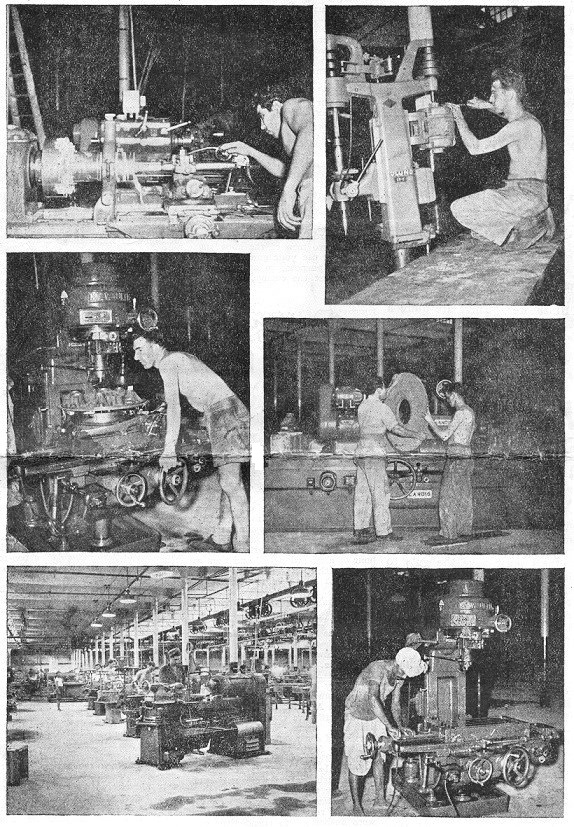 The Machine Shop in Action: Top left; T/Sgt. D. F. Rios machining steel on a tool room lathe.
Right; Sgt. Will Jasmin at drill press.
Center left; Sgt. R. E. Lancey at milling machine.
Right; crank shaft grinder.
T/Sgt. Rios and Sgt. Jasmin change a grinder wheel.
Bottom left; A look down the line.
In the foreground are, Pvts. R. J. Lang, D. J. Hoover and Pfc. R. S. Sheinberg.
Right; Indian cleaning milling machine.
The Machine Shop in Action: Top left; T/Sgt. D. F. Rios machining steel on a tool room lathe.
Right; Sgt. Will Jasmin at drill press.
Center left; Sgt. R. E. Lancey at milling machine.
Right; crank shaft grinder.
T/Sgt. Rios and Sgt. Jasmin change a grinder wheel.
Bottom left; A look down the line.
In the foreground are, Pvts. R. J. Lang, D. J. Hoover and Pfc. R. S. Sheinberg.
Right; Indian cleaning milling machine.